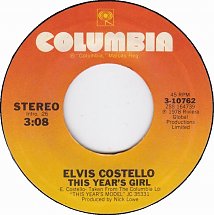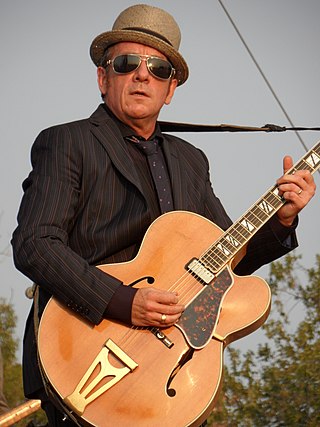
Declan Patrick MacManus, known professionally as Elvis Costello, is an English singer, songwriter, record producer, author and television presenter. Per Rolling Stone, Costello "reinvigorated the literate, lyrical traditions of Bob Dylan and Van Morrison with the raw energy and sass that were principal ethics of punk", noting the "construction of his songs, which set densely layered wordplay in an ever-expanding repertoire of styles." His first album, My Aim Is True (1977), is widely regarded as one of the best debuts in popular music history. It spawned no hit singles, but contains some of Costello's best-known songs, including the ballad "Alison". Costello's next two albums, This Year's Model (1978) and Armed Forces (1979), recorded with his backing band the Attractions, helped define the new wave genre. From late 1977 through early 1980, each of the eight singles he released reached the UK Top 30. His biggest hit single, "Oliver's Army" (1979) sold more than 400,000 copies in Britain. He has had more modest commercial success in the US, but has earned much critical praise. From 1977 through the early 2000s, Costello's albums regularly ranked high on the Village Voice Pazz & Jop critics' poll, with This Year's Model and Imperial Bedroom (1982) voted the best album of their respective years. His biggest US hit single, "Veronica" (1989), reached number 19 on the Billboard Hot 100.
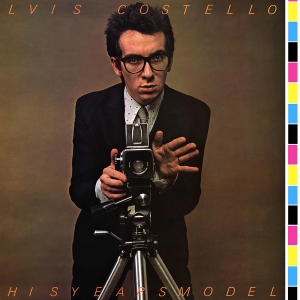
This Year's Model is the second studio album by the English singer-songwriter Elvis Costello, released on 17 March 1978 through Radar Records. After being backed by Clover for his debut album My Aim Is True (1977), Costello formed the Attractions—keyboardist Steve Nieve, bassist Bruce Thomas and drummer Pete Thomas —as his permanent backing band. Recording sessions took place at London's Eden Studios in eleven days between late 1977 and early 1978. Nick Lowe returned as producer, and Roger Béchirian acted as engineer. Most of the songs were written prior to the sessions, and debuted live during the latter half of 1977.
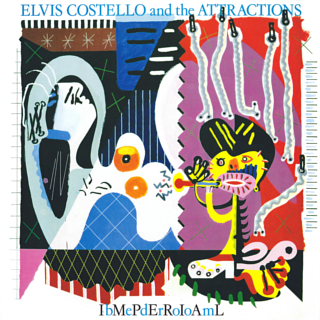
Imperial Bedroom is the seventh studio album by the English singer-songwriter Elvis Costello, and his sixth with the Attractions—keyboardist Steve Nieve, bassist Bruce Thomas and drummer Pete Thomas. It was released on 2 July 1982 through F-Beat Records in the United Kingdom and Columbia Records in the United States. Recording took place at AIR Studios in London from late 1981 to early 1982 with production handled by Geoff Emerick. Placing an emphasis on studio experimentation, the album saw the group use unusual instruments, including harpsichord, accordion and strings arranged by Nieve. Songs were rewritten constantly while Costello tinkered with the recordings, adding numerous overdubs.
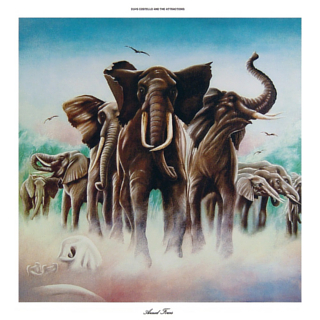
Armed Forces is the third studio album by the English singer-songwriter Elvis Costello, released on 5 January 1979 in the United Kingdom through Radar Records. It was his second album with the Attractions—keyboardist Steve Nieve, bassist Bruce Thomas and drummer Pete Thomas —and the first to officially credit them on the cover. The album was recorded in six weeks from August to September 1978 in London under the working title Emotional Fascism. Produced by Nick Lowe and engineered by Roger Béchirian, the sessions saw Costello exert more control over production compared to This Year's Model, while Nieve contributed more to song arrangements.

Punch the Clock is the eighth studio album by the English singer-songwriter Elvis Costello, and his seventh with the Attractions—keyboardist Steve Nieve, bassist Bruce Thomas and drummer Pete Thomas. It was released on 5 August 1983 through F-Beat Records in the United Kingdom and Columbia Records in the United States. Produced by Clive Langer and Alan Winstanley, the album was Costello's attempt at making a commercial record following years of dwindling commercial success. It was recorded at London's AIR Studios in early 1983 and features contributions from the TKO Horns and Afrodiziak.
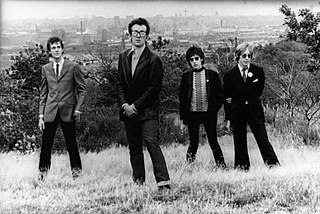
The Attractions were an English backing band for the English new wave musician Elvis Costello between 1977 and 1986, and again from 1994 to 1996. They consisted of Steve Nieve (keyboards), Bruce Thomas, and Pete Thomas (drums). They also released one album as an independent entity, without Costello, in 1980.

"Oliver's Army" is a song written by Elvis Costello and performed by Costello and the Attractions, from the former's third studio album Armed Forces (1979). The song is a new wave track that was lyrically inspired by the Troubles in Northern Ireland and includes lyrics critical of the socio-economic components of war. Costello had travelled to Northern Ireland and was influenced by sights of British soldiers patrolling Belfast. Musically, the song features a glossy production and a keyboard performance inspired by ABBA, creating a juxtaposition between the lyrics and music that both critics and Costello have pointed out.
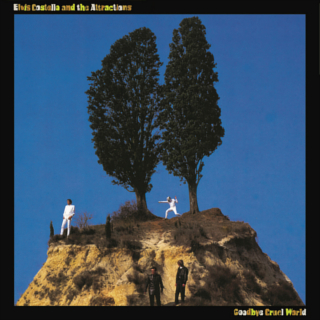
Goodbye Cruel World is the ninth studio album by the English singer-songwriter Elvis Costello, and his eighth with the Attractions—keyboardist Steve Nieve, bassist Bruce Thomas and drummer Pete Thomas. It was released on 18 June 1984 through F-Beat Records in the United Kingdom and Columbia Records in the United States. Produced by Clive Langer and Alan Winstanley, who returned from 1983's Punch the Clock, the album was recorded at London's Sarm West Studios in March 1984 during a period of turmoil for the artist. The problematic sessions included disagreements between Costello and the producers over the album's direction and high tensions amongst the Attractions.

"Radio Radio" is a song written by Elvis Costello and performed by Elvis Costello and the Attractions. The song originated as a Bruce Springsteen-inspired song called "Radio Soul" that Costello had written in 1974. In 1977, Costello reworked the song to feature a more aggressive arrangement and more direct, sarcastic lyrics that criticised the commercialism of British radio. Costello and the Attractions recorded the song around the time of his second album, This Year's Model.
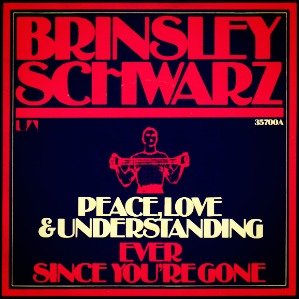
"(What's So Funny 'Bout) Peace, Love, and Understanding" is a 1974 song written by English singer/songwriter Nick Lowe. Initially released by Lowe with his band Brinsley Schwarz on their 1974 album The New Favourites of... Brinsley Schwarz, the song was released as a single and did not chart.

"Pump It Up" is a 1978 song by Elvis Costello and the Attractions. It originally appeared on Costello's second album This Year's Model, which was the first he recorded with the backing group the Attractions. Written as an ironic response to his time during the Stiffs Live Tour and inspired by "Subterranean Homesick Blues" by Bob Dylan, "Pump It Up" features a stomping rhythm and ironic lyrics.

"Man Out of Time" is a song written by new wave musician Elvis Costello and performed by Elvis Costello and the Attractions on their 1982 album, Imperial Bedroom. With lyrics detailing a political scandal, "Man Out of Time" features a lush arrangement that was a conscious departure from the aggressive style of Costello's previous work.

"Watching the Detectives" is a 1977 single by English singer-songwriter Elvis Costello. Inspired by the Clash and Bernard Herrmann, the song features a reggae beat and cynical lyrics.

"(I Don't Want to Go to) Chelsea" is a song written by new wave musician Elvis Costello and recorded by Costello with his backing band the Attractions. The song appeared on Costello's 1978 second album, This Year's Model. Written by Costello while working as a computer programmer, the song was lyrically inspired by films Costello had been watching as well as childhood trips to Chelsea. Musically the song featured influence from bands such as the Who and the Kinks and is notable for Bruce Thomas's prominent bassline.

"New Amsterdam" is a song written and performed by new wave musician Elvis Costello on his 1980 album, Get Happy!! Written about the New World and New York, the recording of the song that appears on Get Happy!! was a demo that Costello had recorded in Pimlico.

"13 Steps Lead Down" is a song written and performed by new wave musician Elvis Costello that was first released on his 1994 album Brutal Youth. Written quickly during a day-long session, the song features lyrics referencing El Escorial and the twelve-step recovery movement. The track is one of those on Brutal Youth that features the reunited Attractions, Costello's longtime backing band.

"Brilliant Mistake" is a song written and performed by new wave musician Elvis Costello that was first released on his 1986 album King of America. Written about Costello's experiences in America, the song features introspective lyrics and a performance from the Confederates, who performed on the track after his usual backing band the Attractions could not perform to Costello's liking.

"I Hope You're Happy Now" is a song written by new wave musician Elvis Costello, recorded by Costello and the Attractions. The track was released on his 1986 album Blood & Chocolate after several failed attempts to record the song for earlier releases.
"New Lace Sleeves" is a song written by new wave musician Elvis Costello and performed by Costello and the Attractions for his 1981 album Trust. The first version of the song was written by Costello in 1974 and featured post-war themed lyrics that were largely scrapped in the final recording. In the final version of the song, Costello included lyrics about seduction and power. Musically, the song was performed at a slower tempo and features a band performance praised by Costello. Pete Thomas notably performed a drum beat inspired by songs from Devo and Stevie Wonder.
"Riot Act" is a song written by new wave musician Elvis Costello and performed by Costello and the Attractions for his 1980 album Get Happy!!. Costello wrote the song as a response to the controversy that had surrounded him in his professional and personal life, particularly relating to his incident in Columbus, Ohio. Recorded originally as a stripped-down acoustic demo, the song was fleshed out in the studio with the Attractions.
